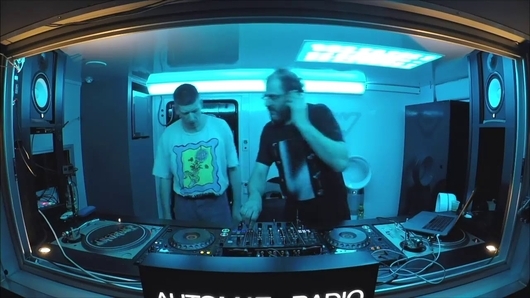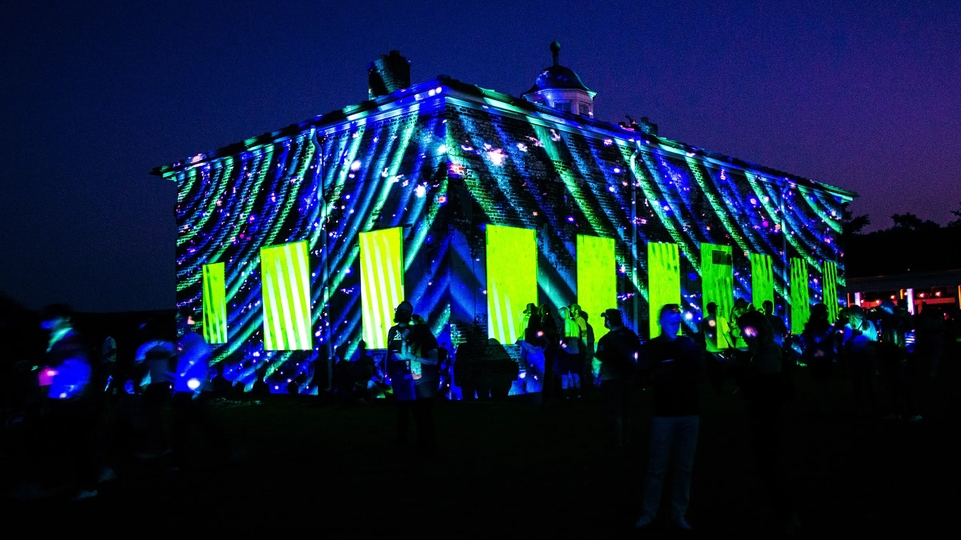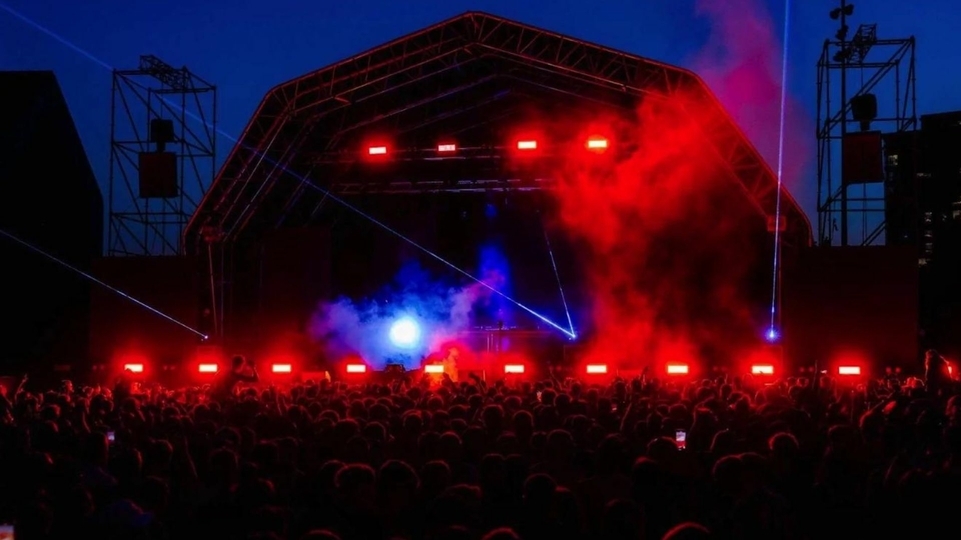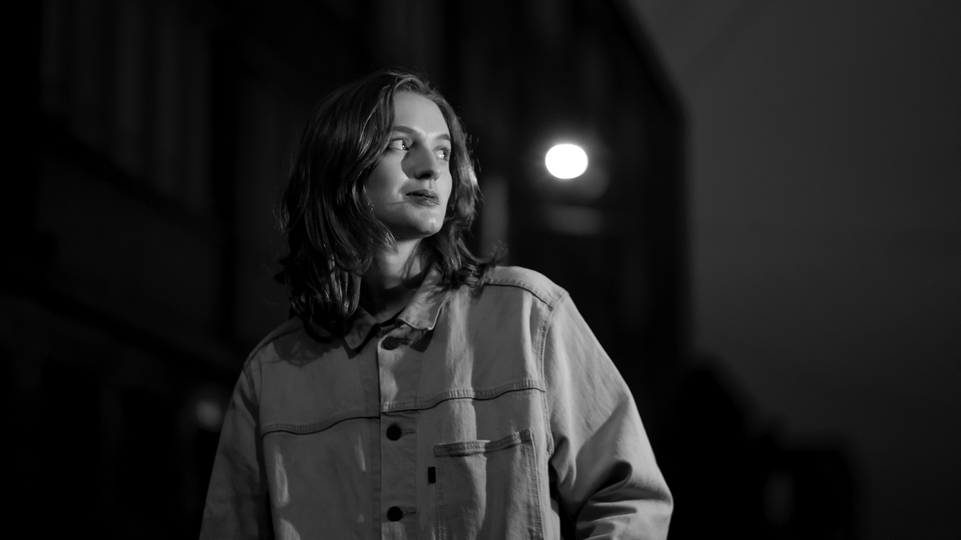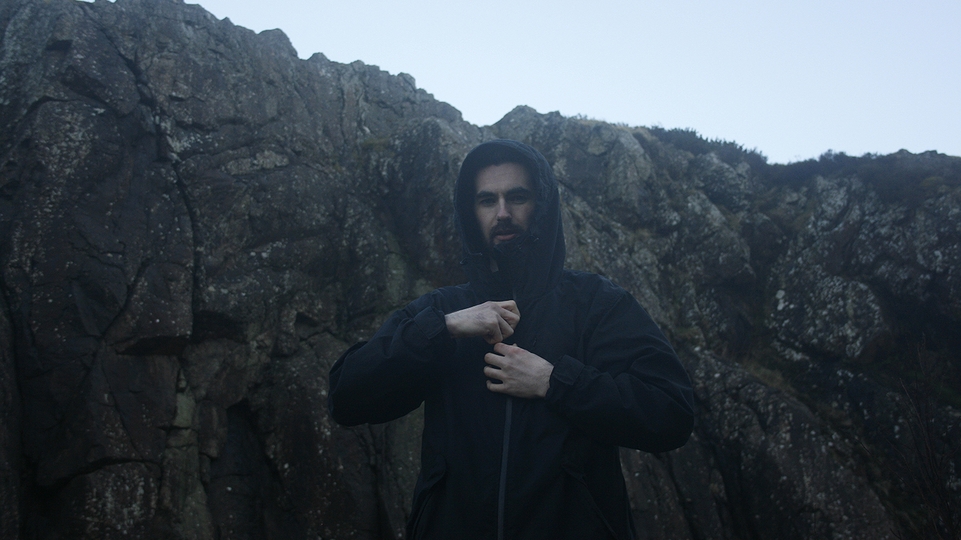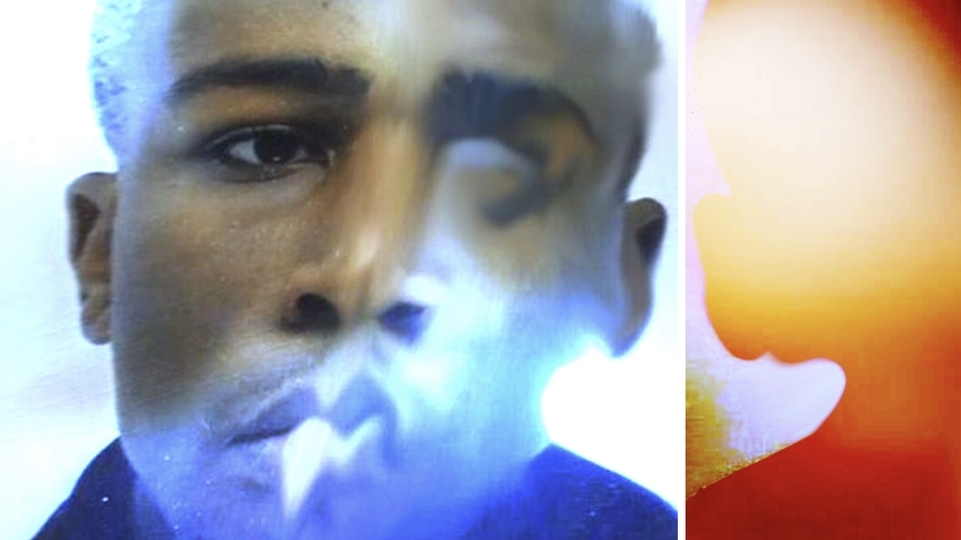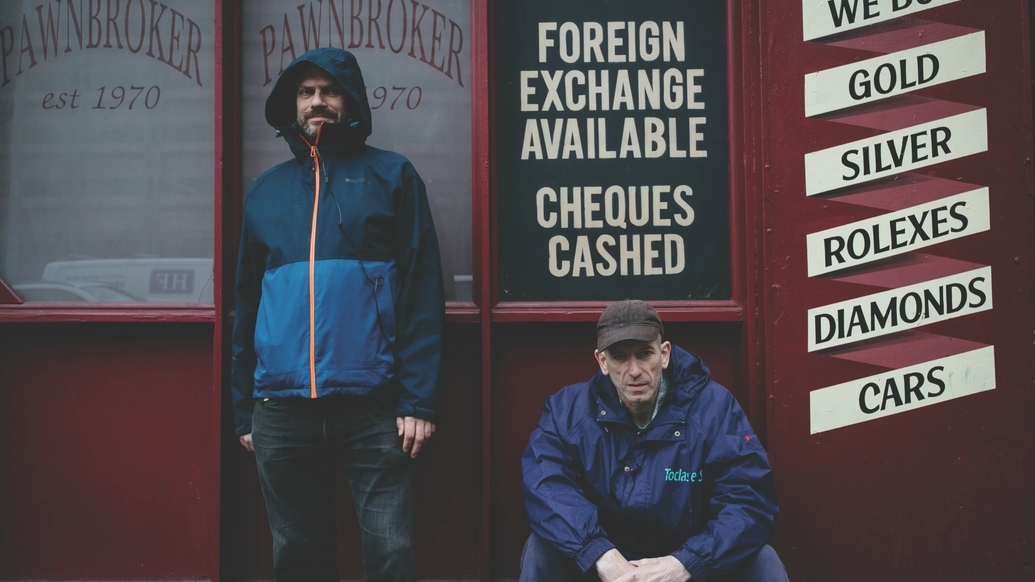
At Home With: Optimo (Espacio)
Keith McIvor and Jonnie Wilkes, aka Optimo (Espacio), have helped define Glasgow’s musical landscape for over two decades with their eclectic and dynamic dancefloor selections. As 2022 marks Optimo’s milestone 25th anniversary, a tour of their home city reveals the ethos behind their inimitable sound
A love of dancing runs deep in Glasgow. And no one better embodies the city’s enduring passion for getting together on the dancefloor than Keith ‘JD Twitch’ McIvor and Jonnie ‘JG’ Wilkes. “For me the best club nights are always where the audience is all mixed up — a diverse range of people who maybe would never meet up otherwise in day to day life,” says McIvor, bathed in the red neon glow of The Berkeley Suite, an intimate club on the fringe of the city centre where we meet on a dreich Tuesday afternoon. “They make connections with people they might not otherwise meet. I think it's a beautiful thing."
Takeaway coffees in hand, McIvor and Wilkes are tucked into a corner seat of the club’s basement. Out of hours, the empty space feels smaller than its more familiar 2AM peak-party atmosphere would suggest. Whispers of the venue’s elegant past — padded red velvet booths, gold candelabra light fixtures, a grand descending staircase entrance — rub shoulders with a soundsystem handbuilt by local company We Enjoy Sound. Hidden behind a cheekily misleading pawn shop façade, The Berkeley Suite is a beautiful example of Glasgow’s rich history of nightlife connections.
A former 1940s ballroom, from a time when the city’s dance hall boom was at its postwar peak, the venue suffered from changing fortunes across the decades, according to McIvor. “"Going back to the 1960s, there was an Indian restaurant that's now closed next door called Koh-I-Noor and it was the first Indian restaurant to really take off in Scotland. There used to be queues round the block. This was a really vibrant area.”
Between the late 1960s and early 1970s, the construction of Glasgow's Inner Ring Road crowbarred the M8 motorway around the city centre, “a catastrophic error of judgement in hindsight that really messed up Glasgow,” says Mcivor. “"That's what really killed this area. The Indian restaurant went into decline, this venue closed, there was a block of tenement flats above here that collapsed. This whole area became quite down at heel by the 1990s. And the bar next door to us, Chinaski's, was what really brought it back to life. Fergus McVicar opened Chinaski's in the late 1990s. It was actually around the time that Optimo first started. And then later he discovered this space, which had been lying in disrepair and used as a storeroom.”
When McVicar transformed the derelict ballroom into The Berkeley Suite around 10 years ago, it roughly coincided with the end of a defining chapter in Optimo’s 25-year career. Their now-legendary weekly Optimo (Espacio) parties at Glasgow’s iconic Sub Club drew to a close in 2010, after running for a solid 13 years. Underpinned by a heartfelt commitment to playing a fiercely diverse spectrum of music, the duo combined techno and house with more unexpected forays into post-punk, new wave, dub, electroclash, Afrobeat and more. ‘Fourth World’ Jon Hassell and ambient Eno cuts could slot in seamlessly alongside an industrial Cabaret Voltaire banger, a Fela Kuti jam or a straight-up classic pop hit.
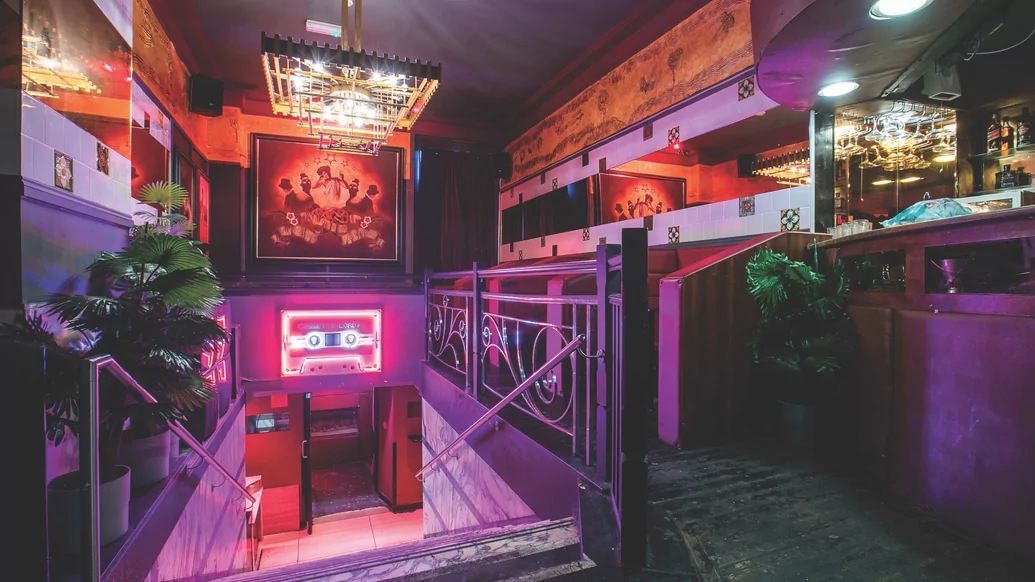
“When we first started Optimo, which was such a long time ago — generations of clubbers back — there was a very small audience that got it and appreciated it, and there were also a lot of people who would come and check it out and be like, 'I fucking hate it'" — Keith McIvor
It was at Sub Club that Optimo cemented their reputation as keenly knowledgeable DJs, with a sixth sense for stitching seemingly disparate tunes into transportative sets. While the Sub Club years remain an essential part of the Optimo story, the pair are now moving gracefully into their silver anniversary year with a newly launched bi-monthly Berkeley Suite residency. Times change, people change, venues change; Optimo’s power to bring good people together to enjoy good music remains the same.
Twenty-five years is an impressive union in any kind of relationship; between McIvor and Wilkes it’s easy to sense a kind of unspoken synchronicity that has kept them together longer than many marriages last. McIvor is the more ebullient of the pair, frequently speaking on their collective behalf, while Wilkes is a more cautious conversationalist, peppering the discussion with thoughtful observations in his gravelly Northern Irish drawl. A case of opposites attract extends to their musical partnership too, with both agreeing that their different tastes and mixing styles make for a push-and-pull sonic scenario that balances the other out.
Among other topics that they unanimously agree on is the extent to which Glasgow has shaped their playing style. Despite a respected international reputation that frequently takes them to clubs and festivals around the world, their sets have always grown and adapted to match the energy of a discerning Glaswegian audience. “When we first started Optimo, which was such a long time ago — generations of clubbers back — there was a very small audience that got it and appreciated it,” recalls McIvor. “And there were also a lot of people who would come and check it out and be like, 'I fucking hate it'. They were hostile to it, and they'd get angry."
"They were very critical, very hurtful and very aggressive in the way they would convey their feelings about how bad they thought it was," Wilkes states frankly. "People were like, 'You can't play those records in the Sub Club'. I guess they felt that Sub Club was the holy grail of house music.” By “those records”, he means the Optimo propensity to throw a funk track, or a reggae tune, or a punk classic into the mix — something that the early crowds struggled to get their ears around, at first. "Over time, people started to get it,” continues McIvor. “And I guess we then had an influence on some other DJs, so people would be playing different music in bars, and the sound that you would hear around Glasgow — without being arrogant — was changing a little bit because of what we'd inspired in other people.
"The way we play is very much determined by a certain Glasgow energy. It moulded us. And we've also found that when we go elsewhere. For example, on Saturday we played for seven hours at a club in Switzerland — you don't get seven hours in Glasgow," he explains, in reference to the city's strict licensing laws and club closing times that rarely extend past 3 or 4AM. "I still find it hard to get away from playing with that Glasgow mindset where you've only got a short window of compressed energy. All Glasgow DJs tend to play like that, because the crowd and the circumstances and constraints have made it that way."
"I read about what people are saying we're supposed to be as DJs, and you'd think we were these genre-defying sorcerers booting open these doors into other worlds,” laughs Wilkes. “It's not always possible to do that! Sometimes you have to hold your crowd and stay focused on the dancefloor and not be too selfish about what you play."
"During the pandemic I felt very disconnected from Glasgow," admits McIvor. "I had to reconnect in some way, and one of the ways we both wanted to reconnect was to do a residency. We'd played here and there over the years since Sub Club, but we felt that it was important for us to be at home more and do something to connect people.
"I don't want to say anything negative about Sub Club, we had an amazing time there,” he continues. “But the locus of where our lives are at has changed. When you've been in a club for 13 years... It wasn't exciting to be in there.”
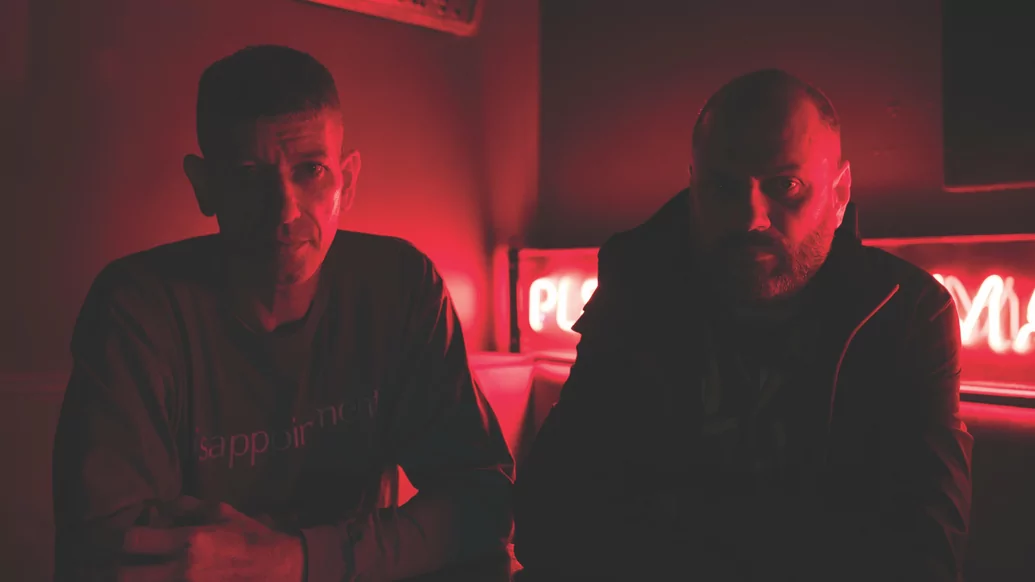
Of course, the true spirit of Optimo has always been as much about community as it is music. From fostering a family of disparate but musically like-minded Sunday night revellers during their Sub Club years, to championing emerging and underground artists via McIvor’s prolific Optimo Music label, to frequently hosting fundraising parties in support of local charities such as Glasgow's Coalition For Racial Equality & Rights, Positive Action In Housing, and various foodbanks across the city, the self-described “global, anti-racist, anti-classist dancefloor duo” have unshakeable faith in music’s ability to unite, resist and empower.
"It already feels, not exactly cemented, but it certainly feels established now,” Wilkes says of the new residency. “As Keith said, we were banged up for two years, and now my eldest son and my nephew are old enough to go to clubs and they come to our night,” he chuckles. “"It's really great to see that in Glasgow, there are these kids who are buzzing so much on what is, at times, quite oddball music, and really engaging with it and freaking out."
"We're quite old, so it's quite a weird thing having a really young audience,” laughs McIvor. "But then again, last time we played here, this guy tapped me on the shoulder and said, 'It's my 70th birthday tonight, and I'm having the best time ever!' So you've got someone who's 70, and then you've got all these 18-year-olds having their first club experience."
Despite their years of experience and evergreen appeal to clubbers of all ages, do they ever have moments of self-doubt? Was there a worry, especially with the launch of the new residency, that people might just stop showing up? "Constantly!" exclaims McIvor, as the pair burst into laughter. "I think you'd be a self-absorbed prick if you didn't have those kinds of thoughts,” adds Wilkes.
Location plays a part in The Berkeley Suite’s appeal too, it turns out. "From where we both live we can walk to this club," explains McIvor. "One time when we were playing here someone had asked for a record, and I thought 'Oh God, I wish I'd brought that one'. So I got Jonnie to play while I literally just walked home to get it," he laughs.
True to his word, our next stop is a short walk away — though a hurried one, thanks to the worsening drizzle. As we leave The Berkeley Suite and cut through the alleyways of Glasgow’s West End, the golden dome of the Central Gurdwara Sikh Temple shines against the dull slate grey sky. Thankfully, we’re soon at Wilkes’ home, walking through the small garden that’s dominated by The Shed. Today the humble green timber structure is stuffed with an assortment of gardening tools, with no musical clues to be seen bar a rather apt poster of Mort Garson’s ‘Plantasia’ affixed to the inside of the door. But over the past two years, The Shed formed a suitably quirky venue for broadcasts during the pandemic, beaming out Optimo transmissions and live streams that kept a community of music lovers united while dancefloors remained empty.
Over a cup of tea around Wilkes’ kitchen table, it’s fitting that the chat turns to the concept of home and what Glasgow means to the pair. Though neither are Glasgow-born — McIvor grew up in Edinburgh, Wilkes in Belfast — they have both lived in the city long enough to reflect on its unique charms and inevitable downsides.
“Glasgow is a great place to live because it’s a very cheap city,” begins McIvor, as the rain lashes noisily against the windows. “I like its down-to-earth quality, it’s quite bullshit-free. It’s very honest, and generally it’s quite friendly. But I hate the sectarianism and I hate the poverty. If I wasn’t doing this, I’d probably be working in the charity sector. I’m able to do a lot of fundraising in this position which I wouldn’t be able to do otherwise. This gives us a platform to channel something back to the community.”
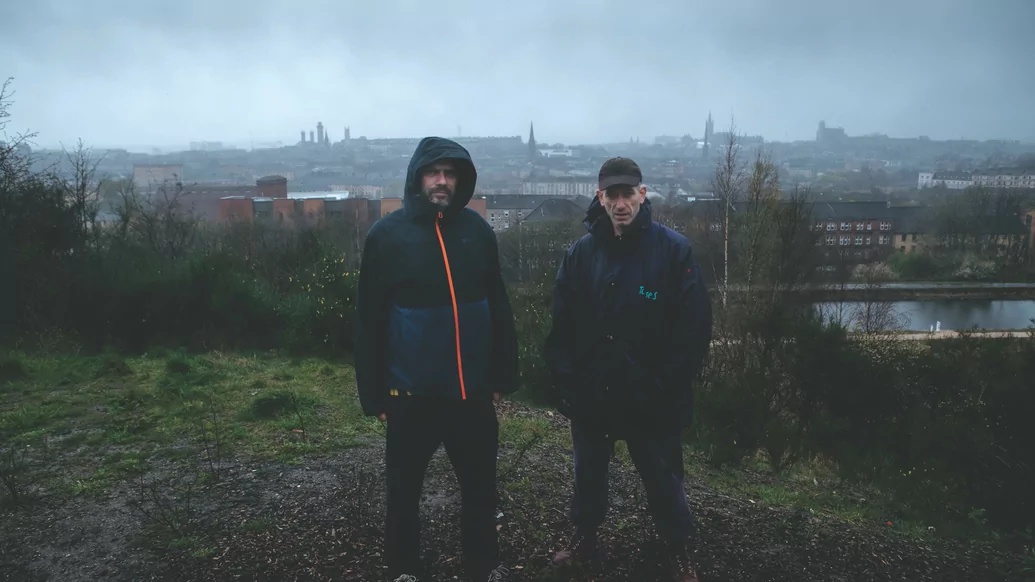
"I read about what people are saying we're supposed to be as DJs, and you'd think we were these genre-defying sorcerers booting open these doors into other worlds. It's not always possible to do that! Sometimes you have to hold your crowd and stay focused on the dancefloor" — Jonnie Wilkes
Glasgow’s notoriously heavy party scene can also be a perilous temptation, they agree. “Young people in the west of Scotland especially, and Northern Ireland — and I was one of them — quite often you just don’t know when to stop,” says Wilkes. “It had begun to destroy my life, especially the creative aspect of it, and I was able to stop, but a lot of people can’t.”
“I think there’s a lot of amazing talent in Glasgow that never really realised their full potential, for that reason,” muses McIvor.
“When I was about eight or nine years old”, recalls Wilkes, “at school we each got asked by the teacher to draw how we imagined another city to be, and I got Glasgow. I remember doing this little drawing of a slag heap, and of a Celtic supporter and a Rangers supporter beating each other up. This picture just looked so miserable and grim,” he laughs. “Then when I was about 18 or 19, my sister was at art college here and I came over to visit her. And I fell in love with the place then and there.” He pauses, then adds, “I’ve never really thought about going anywhere else or living anywhere else since.”
By now the rain is coming down hard, in typical Glasgow fashion. But the deluge can’t deter the pair from “bombing up the road” in Wilkes’ van to the third and final location of the day; a quick stop at The Claypits, Glasgow’s only inner-city nature reserve, a parkland just one mile north-west of the city centre made by reclaiming land from industrial use. “We’re blessed with all these great parks and green spaces. We’re always not that far from nature, and 20 minutes outside of Glasgow you’re in the middle of nowhere,” says McIvor. "Over the years the spaces and parks in the city have become more and more important to us.”
It’s unsurprising, then, that that the first major Optimo party of their 25th anniversary year will take place in Glasgow’s leafy Queen’s Park, followed later in 2022 by the first edition of ‘Watching Trees’, a festival "in the backwoods of The Forest of Dean” in England that will celebrate dancing in the woodlands and open fields. “Glasgow is a city with lots of social problems and is perhaps the poorest city in the UK,” McIvor continues. “It can be easy to live in a bubble of privilege and forget that just a few streets away many people are struggling to feed themselves. Places like The Claypits offer the opportunity to remind myself of this, as well as getting an incredible overview of what a beautiful, constantly morphing and unique city Glasgow is."
Over 25 years, Optimo have continued to craft their own idiosyncratic soundtrack to our lives, providing a communal space for reflection, celebration and solidarity. Looking towards the horizon — both literally and metaphorically — the pair remain optimistic, if not about the state of the world, at least with music’s power to provide an escape from hardship and a place of sanctuary to support one another. “The experience of playing music gives me what I need for fulfilment, artistically,” says Wilkes. “The love of doing it is what keeps me going, and being able to keep playing and make people dance.”
“We live in a terrible time, it’s inarguable,” agrees McIvor. “Great things do happen but people have more worries than they’ve ever had. And I think that’s what it’s all about. Clubbing is such an important release.”

